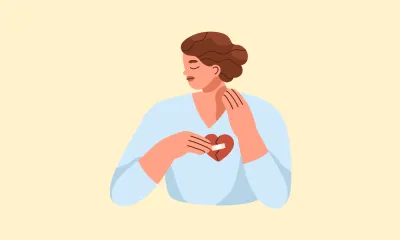
Featured posts


Why Your Husband Looks At Other Females Online

Will I Regret Divorce After Infidelity?

Get Your Ex Back Now: The No Holds Barred Guide
Latest posts

Reveal the secrets in your relationship with these 6 simple questions
- Page 1 of 9
- Older Posts →
Grow Yourself To A Happy You
Our genes and circumstances are responsible for 60 percent of our happiness. We owe the other 40 percent to our thoughts and actions. Even though many of our circumstances are beyond our control and we can’t alter our genes, we can change what we do and what we think.
Research shows that when we embrace personal development, we experience true happiness. When we choose to be intentional about all the things that make us who we are, amazing things happen.
When we focus on personal development, we thrive. That’s why our community is dedicated to exploring these 8 essential anchors for personal development.

| 1. | Improving relationships |
+
|
|
Dubbed ‘Blue Zones’, the five places with the highest life expectancy rates in the world have one thing in common: a deep sense of community. They’re living proof that we need healthy, loving relationships. When we improve our relationships, we fulfill our need for quality connections, Quality connections make us feel loved, valued, and secure. They encourage us to try new things, take risks, and conquer our fears. These connections give our lives purpose. It’s this purpose and sense of belonging that leads to good health and longevity. Navigating the choppy waters of relationships can be difficult, but the rewards are worth it. Better communication skills, a greater sense of fulfillment, and even a drop in stress levels are just some of the many benefits associated with improving our relationships. Relationships also affect how we feel about ourselves. As social beings, our self-esteem is tied to what others think of us. Improving our relationships sets us up for success in other areas of our lives. From a secure foundation of loving relationships, we’re able to go out there and face the world with confidence. We owe it to ourselves and our loved ones to improve our relationships. This means getting better at listening, showing appreciation, and managing conflict. |
||
| 2. | Mending broken relationships |
+
|
|
Broken relationships are synonymous with emotions like anger, frustration, resentment, and guilt. These negative emotions keep us in a constant state of stress. Research has shown that chronic stress reduces our immunity, making us more susceptible to illness. When we mend broken relationships, we free ourselves of negative emotions and enjoy better mental and emotional health. As we practice forgiveness and repair broken relationships, we let go of the destructive power they hold over us, allowing us to devote more emotional energy to other relationships in our lives. Mending broken relationships often requires us to do some introspection. Understanding how our actions contributed to a problem is a powerful exercise in personal development. We’re able to see exactly how we contributed to the breakdown of a relationship and take full responsibility for our actions. When we mend broken relationships, our conflict management skills improve. We’re able to listen better, communicate more effectively, and establish healthy boundaries. As a result, our other relationships are strengthened too. |
||
| 3. | Dealing with stress |
+
|
|
In times of stress, our bodies release the hormones adrenaline and cortisol. Adrenaline heightens our senses while cortisol increases our immunity. When we’re under threat, it’s this response that enables us to fight or take flight. It’s pretty useful when we’re in danger. But over extended periods - not so much. Chronic stress is extremely damaging to our health. In large doses, the very same hormones that are meant to save our lives become toxic. Increased cortisol levels lead to issues such as memory loss, digestive problems, and weight gain. Adrenaline isn’t any better. Consistently elevated levels lead to high blood pressure and an increased risk of heart attack or stroke. When stress becomes a chronic condition, it doesn’t just rob us of our physical health, our mental health suffers too. Chronic stress has been proven to lead to mental health issues such as anxiety and depression. These issues only heighten the stress response, keeping us stuck in a vicious cycle. Sadly, even our relationships fall victim to the negative effects of stress. Stress-induced anxiety and depression can make us distance ourselves from the people we care about or, worse yet, lash out in damaging ways. Good relationships have been proven to reduce the negative effects of stress. Unfortunately, stress usually causes us to push away the very people we should be leaning on. When we find healthy ways to cope with stress, we can fully enjoy the benefits of our relationships. It’s pretty difficult to imagine stress being good for anything - other than running for our lives of course. But it turns out stress can be a pretty powerful motivator - in small doses. When we find ways to cope with stress, we’re able to tap into its more positive aspects. This can make us more productive and free up valuable mental energy. |
||
| 4. | Managing emotions |
+
|
|
Negative emotions like anger, frustration, and guilt can take their toll on our mental and physical health. Left unchecked, these emotions can progress into conditions like anxiety or depression, further diminishing our quality of life. If you’ve ever gone through a breakup, you know just how difficult it can be to drag yourself out of bed and get stuff done. If you’ve ever exploded at someone you love and hurt them with cruel words, you know just how destructive anger can be in relationships. Being able to manage negative emotions keeps us from slipping into toxic stress cycles. No matter what life throws our way, we’re able to make use of healthy coping strategies. Rather than letting negative emotions drag us down, we pick ourselves up. Instead of suppressing or ignoring our emotions, we harness their power. When we’re able to manage our emotions, our relationships flourish. Knowing how to handle situations with tact makes us emotionally attractive. Emotional attractiveness allows us to form deeper emotional connections. The result is stronger, more meaningful relationships. Managing our emotions can make us better at navigating professional settings. Most of our professional success comes from forming strategic connections. When we’re able to regulate our emotions while being sensitive to the emotions of those around us, we develop emotional intelligence, a sought-after trait in leaders and high-value employees. |
||
| 5. | Improving communication skills |
+
|
|
All it takes is four minutes for someone to decide if they like us. It isn’t just about what we say, it’s also a matter of how we say it. From our choice of words to our tone of voice to our body language, we’re communicating something. For us to become good communicators, we need to ensure that the words we use and the nonverbal messages we send are consistent with our intentions. Being able to communicate effectively boosts our self-esteem and confidence. When we have more confidence, we’re more likely to be respected and perceived as trustworthy - two factors that guarantee success in relationships. When we learn how to say exactly what we mean, and to pick up on what those around us are saying (or not saying), our interactions become richer. We avoid awkward misunderstandings and make meaningful connections instead. Improving our communication skills is a lifelong process that can benefit us both personally and professionally. That loving relationship you desire depends on your ability to make a meaningful romantic connection and sustain it. That promotion you want depends on how well you can communicate that you’re the right candidate. Maintaining relationships often requires emotional sensitivity. When we choose to use one word over another, we’re subconsciously ‘reading the room’ and adjusting what we say to suit the situation. The better we get at this, the smoother our interactions become. Similarly, when conflict arises, being able to communicate our views, understand the other person’s perspective, and work with them to find an amicable solution, is a valuable skill. As our communication skills improve, not only do our relationships thrive, but we also get to enjoy all the benefits of meaningful relationships - less stress, improved health, and a feeling of well-being. |
||
| 6. | Improving self-esteem and boosting self-confidence |
+
|
|
Self-esteem gives us strength, resilience, and the ability to deal with life’s difficulties. Because self-esteem is such a vital part of psychological wellbeing, we can’t function without it. It’s in our nature to place expectations on our capabilities. These expectations influence our efforts. When our expectations are low or tainted by limiting beliefs, we can convince ourselves of failure before we even start. However, when our expectations are high and we believe in ourselves, we’re more likely to be successful in our endeavors. Low self-esteem can lead us to feel unworthy of happiness, love, and respect. Often, these false beliefs cause us to make poor decisions or accept situations that are harmful to us. By improving our self-esteem, we’re likely to avoid toxic people and unhealthy relationships. We’re also more likely to speak up for ourselves when we’re being mistreated. Higher self-esteem makes sharing our opinions, thoughts, and ideas easier. When we’re confident, striking up a conversation with a gorgeous stranger isn’t scary, it’s exciting. Delivering an important presentation isn’t daunting, it’s exhilarating. As we increase our self-esteem, vulnerability and authenticity come naturally to us. This makes us more relatable and increases our likeability. Relationships are better when we are confident and self-assured. This is because when we’re secure in ourselves, we inspire trust, a fundamental part of forming lasting connections. When we're secure in ourselves, we aren’t clingy or overbearing. We give the people we care about space and allow them to be themselves. Because we have realistic expectations of ourselves, we’re more likely to extend the same courtesy to them, resulting in healthier emotional bonds. When we’re confident in our abilities, we pursue new opportunities with zeal. We aren’t afraid to try new things or make mistakes. We understand that failure is a part of learning and that it doesn’t diminish our value as human beings. |
||
| 7. | Getting 'unstuck' from unhealthy patterns |
+
|
|
It’s great when our habits are good. When they’re not, it's stressful. Constantly falling into the very behaviors we are trying to avoid creates a cycle of disappointment and self-loathing. This vicious cycle chips away at our self-esteem, keeping us stuck. Bad habits cause us stress, while good habits lower our stress levels. When high stress levels interfere with our ability to function, we can rely on good patterns of behavior to help us get important tasks done. By taking small steps in the right direction, we can achieve major goals. Want to improve your fitness? Hit the gym every day and stick to it. In a few months, you’ll probably see a lot of improvement in your fitness levels. In a year, you probably won’t recognize the person staring back at you in the mirror. Getting ‘unstuck’ requires us to reflect on our behaviors along with the thoughts and feelings tied to them. Because we can only change what we are conscious of, self-awareness is the key to switching out old behaviors for better ones. Breaking old habits increases our awareness of what we want in life. The changes that stick are those that are closely aligned with our desires. When we identify what we truly want out of life, frustration fades away and positive feelings like enthusiasm and determination take over. When we break bad patterns of behavior, we free up valuable mental energy. Instead of dwelling on our mistakes, we’re able to focus on our goals and become the best versions of ourselves. Sticking to good habits requires us to remain in control of our time, energy, and emotions. By staying committed, we develop self-control and assertiveness, two qualities commonly associated with successful goal getters. |
||
| 8. | Achieving goals |
+
|
|
In a culture that often equates busyness with success, it’s easy to feel discouraged when our efforts don’t lead to the results we want. This is where goals come in. Goals are usually a reflection of our hopes, dreams, and desires. They direct our efforts and provide a way for us to focus on the things we value most. When we achieve our goals, we get to live the lives we envision for ourselves. We’re transformed into the people we truly wish to be. We don’t need others to validate our success, and this boosts our self-esteem and confidence. The sense of achievement associated with realizing our goals inspires us and enables us to persevere when challenges arise. As our resolve is strengthened, we start to believe that we’re competent beings who can achieve all that we set our minds to. This drives us to set even bigger goals for ourselves. Resilience, discipline, and patience are all qualities we develop when we pursue our goals. Through handling our expectations and meeting the demands of our goals, we also develop emotional flexibility. As we overcome the many challenges associated with achieving our goals, we develop a growth mindset. Instead of shying away from obstacles or failure, we see them as valuable learning opportunities. |
||






















